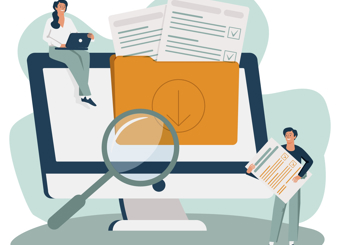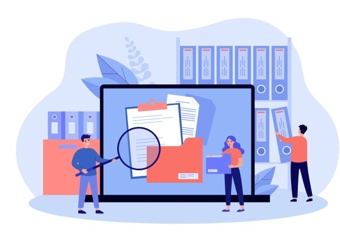eSourcing: process and benefits
“Don’t tell me where your priorities are. Show me where you spend your money and I’ll tell you what they are.” – James W. Frick
eSourcing is the process of obtaining bids from different suppliers via a single online portal. The purpose is to collect and compare information about several suppliers to select a preferred provider. eSourcing systems support mainly steps 4 and 5 in the classical strategic sourcing process.
It covers online support for defining supplier selection criteria (Request for Information, RFI), inviting potential suppliers to tender, performing tender processes (Request for Proposal, RFP and/or Request for Quotation, RFQ) running eAuctions, analyzing and evaluating responses, and finally, awarding contracts.
eSourcing Process Steps
Create a Request for Information (RFI)
Assess the suitability of a supplier, often referred to as creating a Request for Information (RFI). Create the questions you need to be answered in order to do business with a supplier, financial stability, compliance requirements, Code of Conduct, etc. The RFI can be set up with shall and should requirements, and answering formats for the supplier can range from free text, yes/no, multi-selections, and more.
Create a Request for Quotation (RFQ)
Supplier that fulfill your criteria in the RFI may be invited to quote. The buyer creates forms asking the prices of products or services they can render. Also, you can run a Request for Proposal (RFP) when these two steps are combined into one, i.e., the supplier both answer questions and quote a price.
In the past, procurement teams would have to manually fill out these questions and their quotes in Microsoft Word or Excel. With eSourcing, the process is streamlined, as suppliers login and upload their answers into the eSourcing software.
Supplier-buyer communication during the RFQ process is performed and logged inside the eSourcing platform. AP automation removes additional manual work for the buyers connected to supplemented quotes and question-and-answer sessions.
Evaluate your quotations
Once the requested evaluation formats have been sent and received, an evaluation process takes place, where the prospective buyers evaluate whether the information they’ve been provided with makes them a viable supplier or not. The evaluation step is where you see the main savings in terms of efficiency. This process used to involve manually sorting through stacks of paperwork supplied by the suppliers invited to provide a quote. Comparing apples to apples was almost impossible as all suppliers used different formats to answer. eSourcing changes this – and provides a sophisticated suite of analytics, dashboards, and tools like automated scoring – allowing users to automate elements of the evaluation process, and therefore, save time.
Set up an eAuction
In the eAuction, suppliers compete on price on a set time frame. Depending on set-up and configuration, you can choose to be transparent with for example, “best price”, the suppliers own “price and rank” or different combinations of these for example, “top three,” etc.
eAuctions can be run at any point in the eSourcing process, but best practice is to make sure it follows a RFQ, at least if the category is more complex, as most suppliers like to know they have been compared in a fair way before competing on price. If the product or service is less complex and standardized, and specifications are clear, the bidding process can start with an eAuction. Most eSourcing software can handle a couple of different types of auctions, each with unique benefits, for example, English auctions, Dutch auctions, Vickrey auctions, etc.
Auctions are designed to encourage prospective suppliers to compete with one another and, as such, deliver the best possible deal for procurement professionals. To put it simply, by using the eAuction, the buyer can negotiate price with more suppliers compared to a manual process where buyers go from a long list of suppliers to a shortlist because they don’t have the capacity to run negotiations with one or two suppliers, and at the best, a handful.
Award the business
The final step is awarding business to the winning supplier(s). Elements of this process can be automated by automatically sending the winning bidder a contract.
Benefits of eSourcing
The eSourcing process offers many benefits; it reduces costs while maximizing efficiency, transparency, and compliance.
- Because eSourcing allows you to evaluate a broader range of suppliers and leveraging different eAuction strategies, you keep competition longer in the process, which can present significant cost savings.
- Electronic sourcing reduces the amount of time procurement specialists spend on the tendering process, and therefore, freeing up time to increase spend under management and negotiating more spend volumes on to favorable agreements.
- eSourcing improves transparency between buyers and suppliers. A portal is typically used, where suppliers can see deadlines, status, and other key information.
- With all procurement-related documents stored in one place, auditing is made simpler, and therefore, so is compliance with regulatory procedures.





